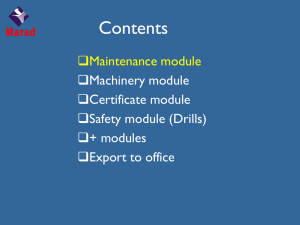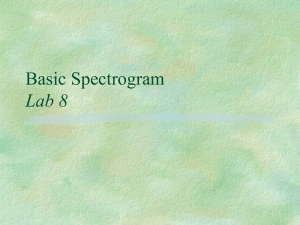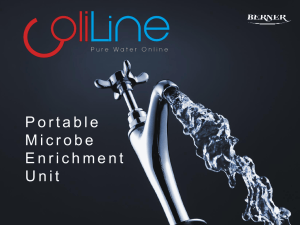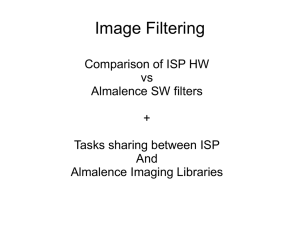Gilian BDX-II Air Sampling Pump
advertisement
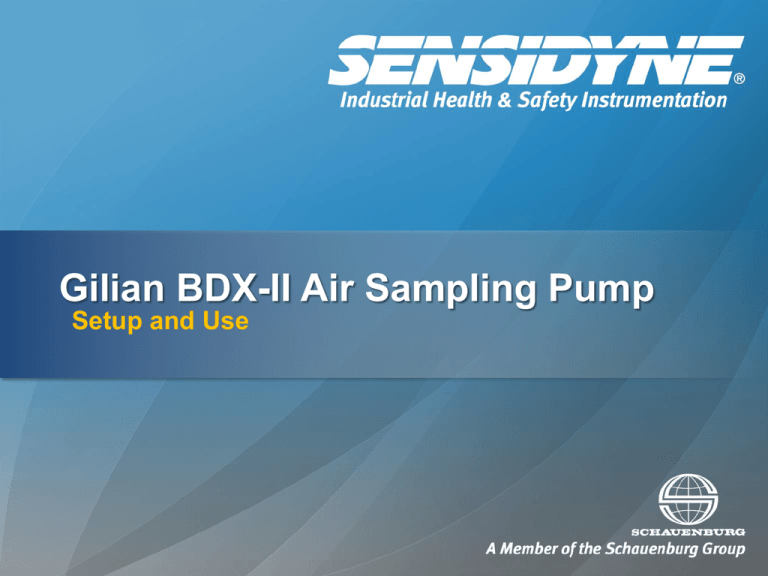
Gilian BDX-II Air Sampling Pump Setup and Use Gilian BDX-II • Designed for ease-of-use in abatement applications – Lead abatement – Asbestos abatement • Robust design • Light weight • Built-in rotameter • Rechargeable battery Pump Layout Prepare for Sampling Before sampling: 1. Ensure the pump is fully charged 2. Assemble the sampling train 3. Calibrate the pump to the proper flow rate Calibration (Flow Adjust) • To ensure proper operation of the BDX-II Abatement Air Sampling Pump, the unit should be properly calibrated prior to sampling. • The calibration (flow adjust) is recommended using a Gilibrator-2 precision electronic flowmeter. If you use a precision bubble meter other than the Gilibrator-2, make certain you follow the instructions that came with your device. Calibrating the BDX-II 1. Make certain the unit is properly charged. 2. Using a small Phillips screwdriver, back out the holding screw just enough so the anti-tamper cover plate can be rotated 180°. This exposes the On/Off switch and the flow adjust screw. 3. Assemble the cassette filter holder for the sampling media. Use the appropriate filter for the sampling method. Compress the cassette by using a mechanical press or other means of applying pressure. Use shrink tape around the cassette to cover joints and prevent leakage. If a cassette adapter is used, make certain it does not come in contact with the backup pad. Calibrating the BDX-II 4. Move the On/Off switch to the On position. 5. Set the pump flow rate by turning the flow adjust screw (clockwise for increased flow and counterclockwise for decreased flow). 6. Use the built-in rotameter on the BDXII as a flow indicator only. Accurate flow adjustment settings must be made by using a Gilibrator-2, or equivalent flow calibration device, for calibration measurements. Calibrating the BDX-II 7. When calibrating the sampler for flow, the sample collection device (cyclone, impinger, filter cassette or sorbent tube) should be in-line. 8. When the desired flow rate has been attained, move the On/Off switch to the Off position. 9. The unit is now ready for sample collection. Begin Sampling • Begin the sample run by switching the On/Off switch to the On position. • Secure the front anti-tamper cover. • The pump will operate at the flow rate set at the last calibration (flow adjustment). • The sampling run is terminated by moving the On/Off switch to the Off position. – Note: It may be necessary to readjust the flow rate at least 2 times during the sampling period in order to maintain flow within ± 5% of the set flow rate. After Sampling • After sampling, remove the filter cassette and prepare the cassette filter for analysis. • Replace the cassette filter with a clean fresh filter. • Fully charge the battery pack (preferably overnight) to ensure enough power to complete the entire next sampling period. • Actual time to achieve a fully charged battery pack depends on the charging device used, see user manual for detail. Maintenance • • The BDXII Abatement Air Sampling Pump is relatively maintenance free. Most maintenance involves periodic inspection of the unit, battery maintenance, and filter maintenance. General inspection involves checking the unit for blockage and pump capacity as follows: – – – – – – Examine the unit for physical damage. Make certain that all case components and connections are tight. Turn on the pump and check the flowmeter. If there is no flow, check all tubing for blockage. Check for gross contamination with dust, mud, etc. If contaminated or excessively dirty, replace the internal filter. See the Troubleshooting Guide in the user manual and make any corrective action. If the problem still exists, return the unit for repair Inlet Filter Maintenance • • The BDX-II internal filter should be changed whenever it becomes clogged or dirty. The condition of the internal filter is visible through the clear window on the filter assembly. To change the BDX-II filter follow these steps: 1. 2. 3. 4. 5. 6. 7. 8. 9. • Make certain the pump is turned off. Remove any tubing attached to the pump. Remove the 4 housing screws on the filter housing. Remove the filter housing from the unit. Remove the filter O-ring from the filter housing. Remove and discard the old filter. Insert a new filter in the filter housing. Make certain the filter is properly centered and flat. Insert the filter O-ring in the filter housing. Make certain the O-ring is properly seated. Reinstall the center O-ring (orange) in its place on the pump. Make certain it is properly seated. Reinstall the filter assembly back on the unit. Insert and tighten the 4 screws. Repeat this procedure on a periodic basis or whenever the filter becomes clogged or dirty.
